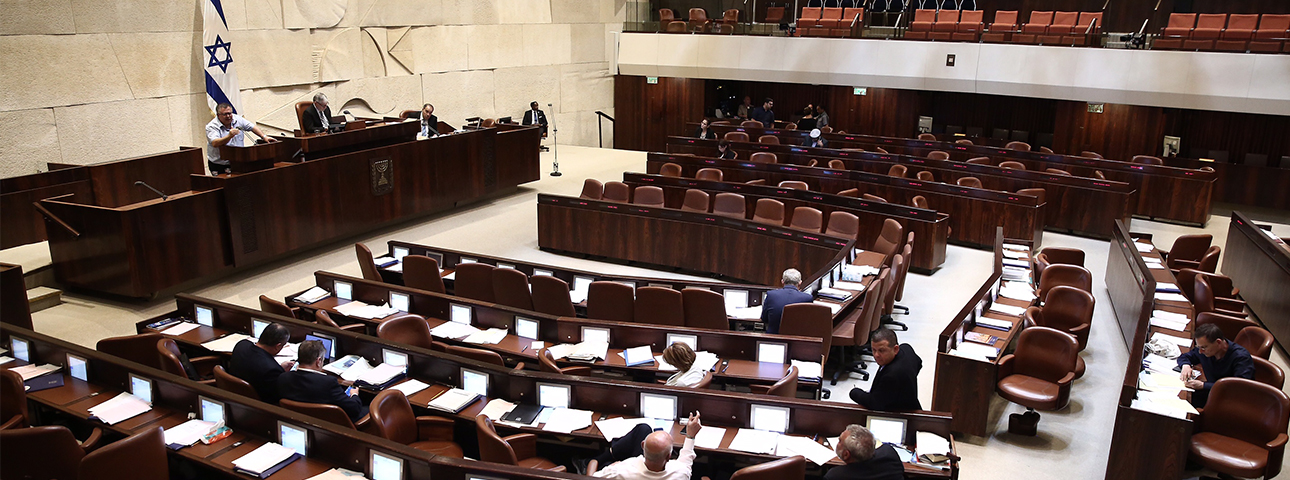A Storm in a Teacup
Israel need a new and improved code of ethics

When President Reuven Rivlin spoke at the opening of the Knesset session in October 2017, he spoke of the lack of statesmanship in Israeli politics. Statesmanship or lack thereof has been looming in the background of a long list of scandals that have rocked Israeli politics in recent years, including many cases of unethical or inappropriate behavior by Knesset members. Unfortunately, even cases such as these do not unify parties' leaders. Time and again, when public officials violate the norms of what is considered “appropriate” behavior, MKs reactions focus on excessive forms of punishment rather than on the matter itself.
We need to institute a new code of ethics - the existing code for MKs is outdated and confused, and ignores a number of critical issues.
After an incident in which members of Knesset (MKs) from The Joint List (a political alliance of four mainly Arab parties) held up signs of protest during Vice President Pence's speech to the Knesset plenum, calls were made for them to be punished severely. It was proposed that the powers of the Knesset Ethics Committee be extended so they could punish any MK who interrupts the speech of a foreign dignitary, and not only to suspend the offender from plenary and committee discussions for six months but also withhold their salary during the period of suspension.
This proposal is unnecessary, seeing as the Ethics Committee already has the power to suspend a MK for six months, and withhold their pay for two weeks. When MK Anastassia Michaeli (Yisrael Beytenu) poured a glass of water over MK Raleb Majadele (Labor) in 2012 at a Knesset committee meeting—an act of physical violence—she was only suspended from the Knesset plenum and committee meetings for a month. Clearly, there is no need to provide the Knesset Ethics Committee with additional tools to punish MKs if it does not make full use of those tools it already possesses.
Yet what is most regrettable is that time and time again, the Knesset is in uproar over trivial matters. If we wish to improve the conduct and image of MKs, we need to institute a new code of ethics within the Knesset. The existing code is outdated and ignores a number of critical issues.
A decade ago, serious efforts were put into formulating a new code of ethics for Knesset: Between the years 2003 and 2006, at the order of the current President of Israel, then speaker of the Knesset, Reuven Rivlin, a public committee headed by former Supreme Court Justice Yitzhak Zamir was tasked with drawing up new guidelines of ethical conduct for MKs. Subsequently, a Knesset subcommittee, which operated from 2009 until 2011, was appointed to formulate and approve guidelines of ethical conduct for MKs, based on the public committee's recommendations.
Both committees proposed new ethical guidelines regarding substantial issues such as the relations between MKs and lobbyists. Currently there are no restrictions on MKs (other than general rules that ban MKs from accepting gifts and benefits from lobbyists). Thus all restrictions that are in place apply solely to lobbyists.
The Zamir Committee’s recommendations sought to change this by amongst other things, requiring MKs who discuss a particular issue at a Knesset committee to disclose whether they have been approached by lobbyists on the matter, as well as forbidding MKs to commit to lobbyists that they will take a certain course of action on the issue. The proposed ethical guidelines also addressed many other issues including; conflicts of interest, disclosure of MKs’ assets and additional roles, MK absences from plenum sessions, and even proposed appointing a professional ethics counsel to the Knesset. Such matters have far more of an impact on the work of MKs and the extent of the public's trust in them, than does the waving of protest banners in the plenum.
However, these guidelines were met with a great deal of opposition from MKs, who prefer not to be burdened by additional restrictions. Consequently, such guidelines have not been implemented.
At a time when public trust in the Knesset and its members is at an all-time low, it seems vital to make it our priority to address these important issues. After all, would it not be more beneficial for MKs to work towards introducing a new and improved code of ethics than to advance populist legislation aimed at making headlines?
The article was published in the Jerusalem Post
